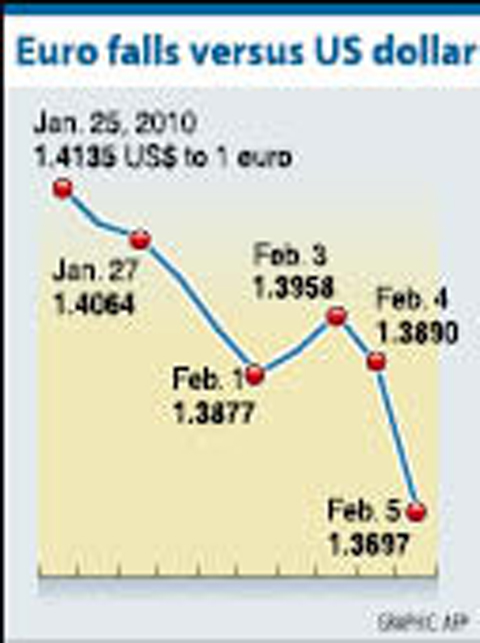Asian currencies dropped for a fourth week, the longest run of losses since June, as concern that some European nations would struggle to contain and finance budget deficits eroded demand for emerging-market assets.
Malaysia’s ringgit and the Singapore dollar led declines as the MSCI Asia-Pacific Index of regional shares slumped to a 10-week low.
The ringgit dropped 1 percent this week to 3.4445 per US dollar in Kuala Lumpur, and touched a four-month low of 3.4540 on Friday, according to data compiled by Bloomberg. The Singapore dollar lost 1.3 percent to S$1.4233, while the South Korean won slid 0.7 percent to 1,169.45.

The New Taiwan dollar yesterday traded near the strongest level in three weeks, closing up NT$0.003 to NT$32.184 against the US dollar.
The euro headed for a fourth weekly loss versus the US dollar and yen. The euro slid 1.3 percent to US$1.3678 from US$1.3863 last Friday. Against the yen, the euro dropped 2.4 percent to ¥122.09, after falling 3.4 percent on Thursday, the biggest drop since October 2008. The US dollar fell 1.1 percent to ¥89.25, from ¥90.27 last week.
The pound declined 2.2 percent in the week, the most since the five days through Sept. 18, and was at US$1.5630 as of 5:30pm in London on Friday. Sterling declined 0.5 percent to £0.8716 per euro and was 3.3 percent weaker at ¥139.60.

People can preregister to receive their NT$10,000 (US$325) cash distributed from the central government on Nov. 5 after President William Lai (賴清德) yesterday signed the Special Budget for Strengthening Economic, Social and National Security Resilience, the Executive Yuan told a news conference last night. The special budget, passed by the Legislative Yuan on Friday last week with a cash handout budget of NT$236 billion, was officially submitted to the Executive Yuan and the Presidential Office yesterday afternoon. People can register through the official Web site at https://10000.gov.tw to have the funds deposited into their bank accounts, withdraw the funds at automated teller

PEACE AND STABILITY: Maintaining the cross-strait ‘status quo’ has long been the government’s position, the Ministry of Foreign Affairs said Taiwan is committed to maintaining the cross-strait “status quo” and seeks no escalation of tensions, the Ministry of Foreign Affairs (MOFA) said yesterday, rebutting a Time magazine opinion piece that described President William Lai (賴清德) as a “reckless leader.” The article, titled “The US Must Beware of Taiwan’s Reckless Leader,” was written by Lyle Goldstein, director of the Asia Program at the Washington-based Defense Priorities think tank. Goldstein wrote that Taiwan is “the world’s most dangerous flashpoint” amid ongoing conflicts in the Middle East and Russia’s invasion of Ukraine. He said that the situation in the Taiwan Strait has become less stable

REASSURANCE: The US said Taiwan’s interests would not be harmed during the talk and that it remains steadfast in its support for the nation, the foreign minister said US President Donald Trump on Friday said he would bring up Taiwan with Chinese President Xi Jinping (習近平) during a meeting on the sidelines of the APEC Summit in South Korea this week. “I will be talking about Taiwan [with Xi],” Trump told reporters before he departed for his trip to Asia, adding that he had “a lot of respect for Taiwan.” “We have a lot to talk about with President Xi, and he has a lot to talk about with us. I think we’ll have a good meeting,” Trump said. Taiwan has long been a contentious issue between the US and China.

Japanese Prime Minister Sanae Takaichi yesterday lavished US President Donald Trump with praise and vows of a “golden age” of ties on his visit to Tokyo, before inking a deal with Washington aimed at securing critical minerals. Takaichi — Japan’s first female prime minister — pulled out all the stops for Trump in her opening test on the international stage and even announced that she would nominate him for a Nobel Peace Prize, the White House said. Trump has become increasingly focused on the Nobel since his return to power in January and claims to have ended several conflicts around the world,